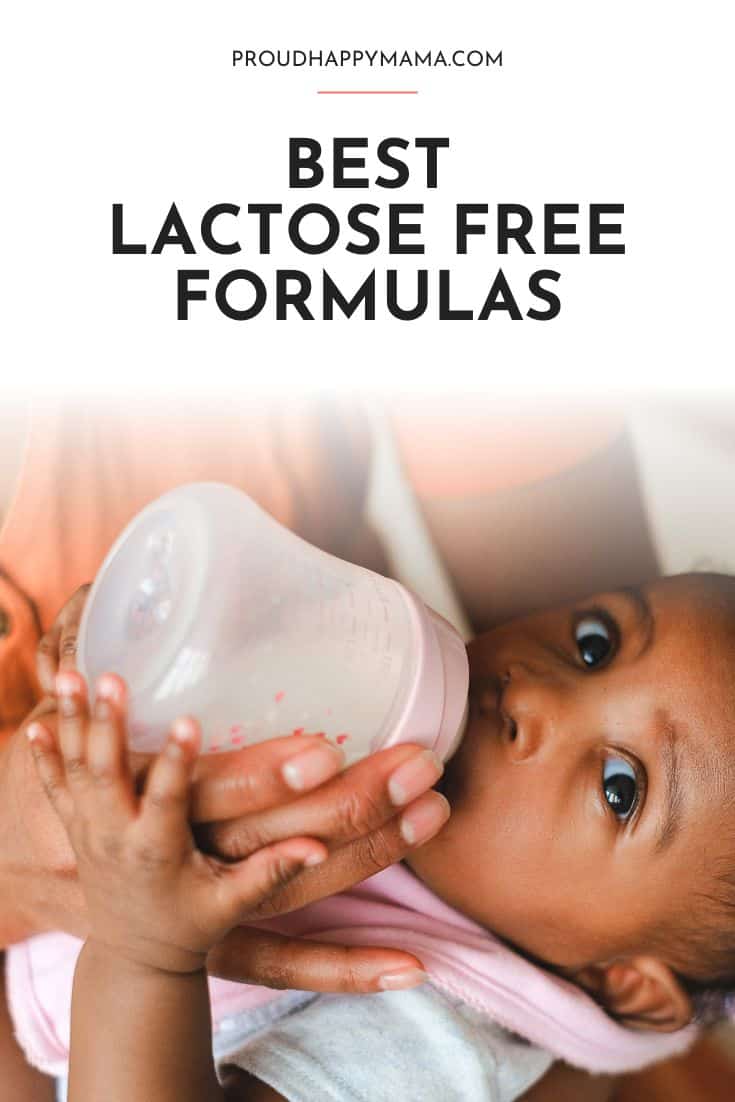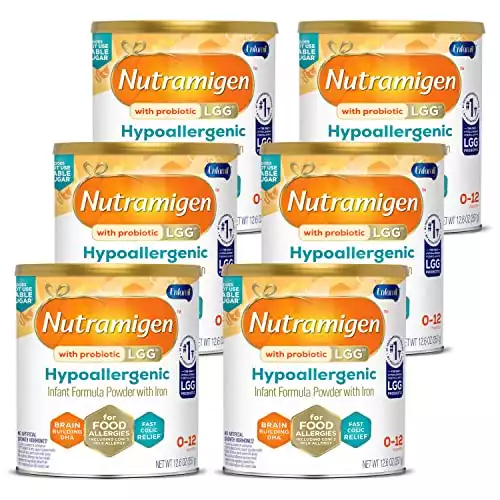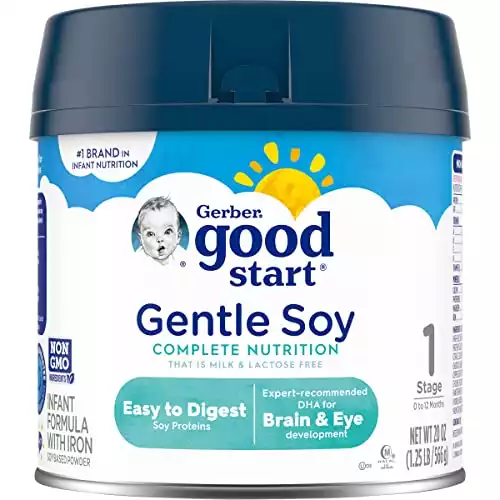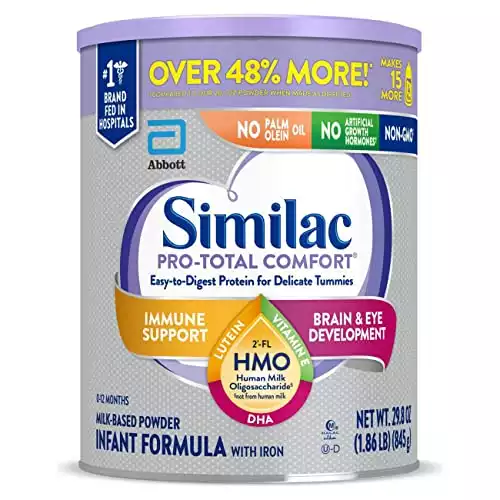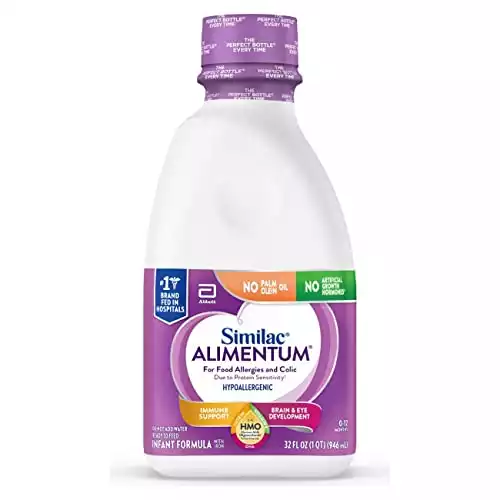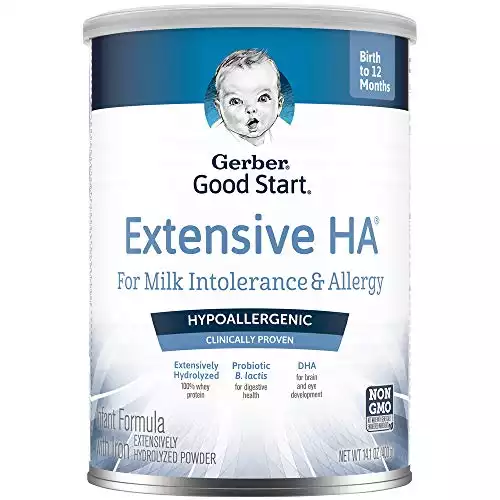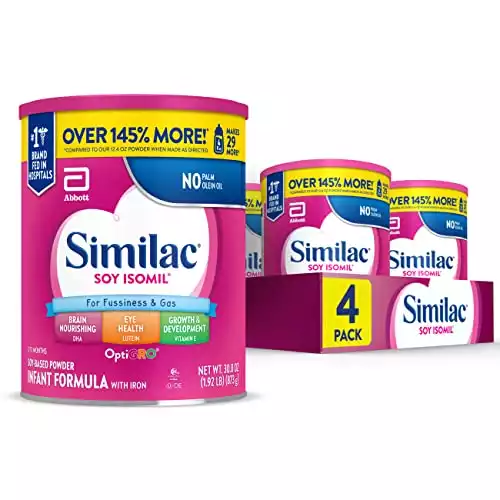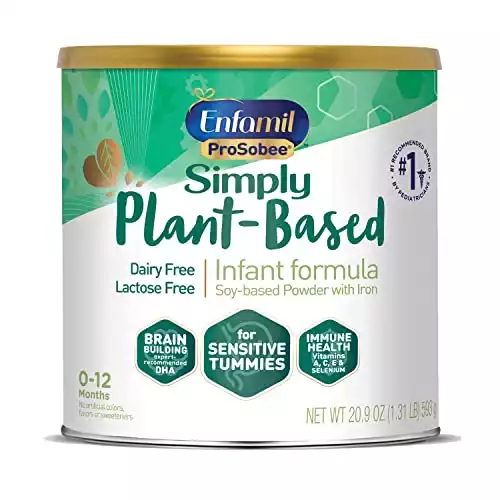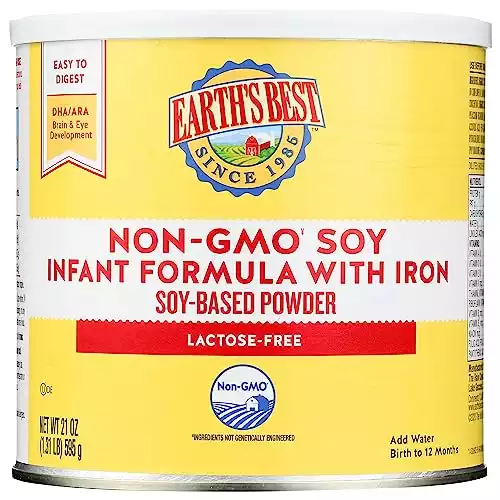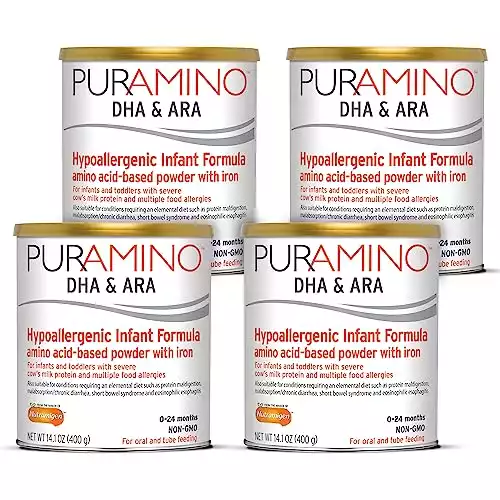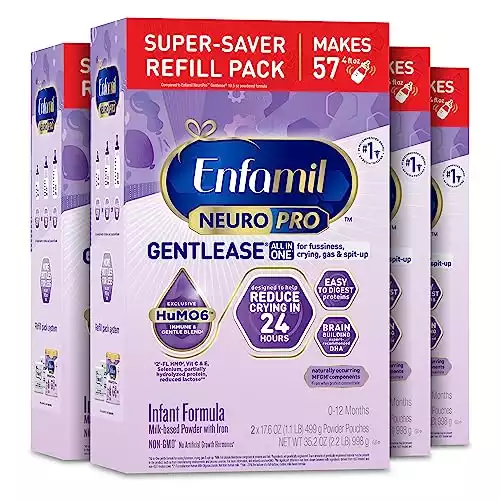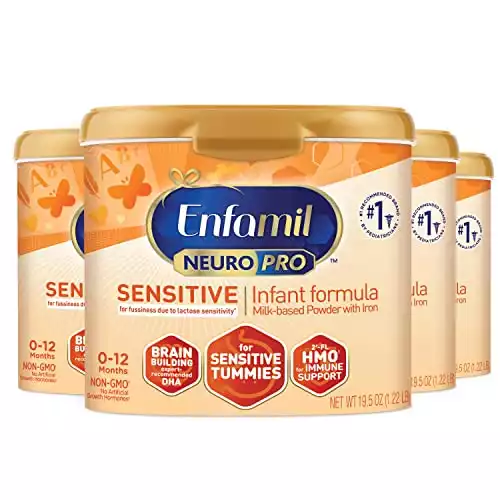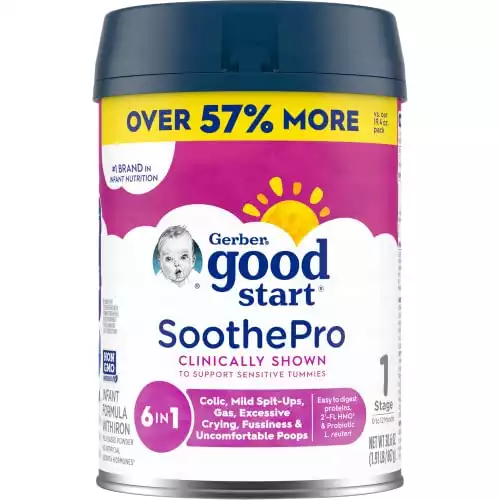Best Lactose Free Formula
Lactose-free formula is a specialized baby formula that does not contain lactose, a natural sugar found in milk and dairy products. Lactose is a disaccharide composed of glucose and galactose, and it serves as an important source of energy in regular milk-based formulas and breast milk.
Babies with lactose intolerance or sensitivity may have difficulty digesting lactose due to a deficiency in the enzyme lactase, which is responsible for breaking down lactose into its simpler sugars. As a result, consuming lactose-containing formulas can lead to digestive discomfort, including gas, bloating, diarrhea, and fussiness.
Thankfully, there is a large range of lactose-free formula available that offer an alternative that is easier on sensitive tummies, providing the necessary nutrition for healthy growth and development without the inclusion of lactose. This specialized formula ensures that babies with lactose intolerance can still receive essential nutrients like proteins, fats, vitamins, and minerals in a more easily digestible form.
For babies who experience adverse reactions to regular milk-based formulas or breast milk containing lactose, lactose-free formula becomes a suitable option, providing comfort and nourishment without compromising their well-being.
So, if you’re wondering what the best lactose free formula for babies is, I’m here to save you from hours of scrolling and searching. I’ve done the research for you and came up with a list of the top lactose free baby formula, so you can find a formula free from lactose that suits you and your baby.
This post contains affiliate links. See our full disclosure here
|
4.7
|
4.7
|
4.5
|
|
$37.84 ($3.00 / Ounce)
|
N/A
|
|
|
Pros:
|
Pros:
|
Pros:
|
- Hypoallergenic
- Easy Digestion
- Contains probiotic LGG for gut support
- Contains DHA and ARA for brain support
- Clinically shown to reduce colic due to cow’s milk allergy within 48 hrs
- Pediatrician Recommended
- Lactose-free
- Plant Based Protein
- Lactose Free
- Calcium & Vitamin D for strong bones & teeth
- DHA for brain & eye development
- Easy-to-Digest
- Reduced Colic Symptoms
- Contains 2'-FL HMO for immune support
- Enriched with DHA and lutein
- No Palm Olein Oil
- Non-GMO

Why Choose A Lactose Free Formula
Choosing a lactose-free formula may be necessary for some babies due to various reasons. Here are some key situations where opting for a lactose-free formula can be beneficial:
Lactose Intolerance
Babies with lactose intolerance lack enough lactase, the enzyme responsible for breaking down lactose in milk. As a result, consuming lactose-containing formulas can lead to digestive issues such as gas, bloating, diarrhea, and fussiness. Lactose-free formulas provide an alternative that is easier to digest for these babies.
Milk Protein Allergy
Some babies may be allergic to the proteins found in cow’s milk, leading to allergic reactions such as skin rashes, eczema, vomiting, and diarrhea. Lactose-free formulas, especially hypoallergenic ones, often contain partially or extensively hydrolyzed proteins that are broken down to minimize the risk of allergic reactions.
Sensitivity to Cow’s Milk
Even if a baby doesn’t have a full-blown allergy to cow’s milk, they can still have sensitivities to the proteins or lactose present in regular cow’s milk-based formulas. Switching to a lactose-free formula can help alleviate discomfort and digestive issues.
Gastrointestinal Disorders
Babies with certain gastrointestinal disorders, such as colic, reflux, or chronic diarrhea, may benefit from lactose-free formulas as they put less strain on their digestive system.
Family History
If there’s a family history of lactose intolerance or milk protein allergy, parents might opt for a lactose-free formula from the start to reduce the risk of potential issues.
Weaning from Breastfeeding
In cases where breastfeeding is not possible or being phased out, lactose-free formulas can provide a suitable alternative for babies who are accustomed to breast milk.
Temporary Digestive Issues
Some babies may experience temporary digestive upset or intolerance to lactose due to illness or antibiotic use. In such cases, using a lactose-free formula during this period can help manage symptoms until the baby’s gut health improves.
Before deciding to use a lactose-free formula, it’s crucial to consult with a pediatrician. They can help identify the specific reason for considering a lactose-free formula and provide appropriate recommendations based on the baby’s individual health needs. Lactose-free formulas come in various types, such as hypoallergenic, soy-based, partially hydrolyzed, and amino acid-based formulas, and the pediatrician can guide parents in selecting the most suitable option for their baby.
Lactose Free Vs Dairy Free Formula
Lactose-free and dairy-free formulas are two distinct types of baby formulas, each designed to cater to different dietary needs and sensitivities. Understanding the differences between these formulas is essential for selecting the most suitable option for your baby’s health and well-being.
Lactose-Free Formula
Lactose-free formulas are derived from dairy sources, such as cow’s milk, but the lactose component is removed. Lactose is a natural sugar found in milk, and some babies may have difficulty digesting it due to lactose intolerance or sensitivity. Lactose-free formulas offer a gentler alternative that is easier on sensitive tummies, reducing the risk of digestive discomfort and related issues.
You may opt for lactose-free formula if your baby experiences gas, bloating, diarrhea, or fussiness after consuming regular cow’s milk-based formulas. Lactose-free formulas can be suitable for babies with lactose intolerance or mild lactose sensitivity.
Dairy-Free Formula
On the other hand, dairy-free formulas are entirely sourced from non-dairy origins, such as soy, rice, or other plant-based ingredients. These formulas do not contain any dairy components, including lactose. Dairy-free formulas are specifically designed for babies who have more severe dairy allergies or intolerances, as well as those following a vegan or vegetarian diet.
You may look to choose a dairy-free formula if your baby has a confirmed dairy allergy or severe dairy intolerance. Additionally, if you follow a vegan lifestyle and prefer a plant-based formula for your baby, dairy-free options are a suitable choice.
Before making any changes to your baby’s diet, I always recommend consulting with your pediatrician. They can evaluate your baby’s individual health needs and help you choose the best formula option, ensuring your little one receives the necessary nutrition for healthy growth and development.
Factors to Consider When Choosing Lactose-Free Formulas
When choosing a lactose-free formula for your baby, several factors should be taken into consideration to ensure that you select the most suitable option. Here are the key factors to consider:
- Lactose Intolerance or Sensitivity – Determine if your baby has been diagnosed with lactose intolerance or if they exhibit symptoms of lactose sensitivity, such as excessive gas, bloating, diarrhea, or fussiness after consuming regular cow’s milk-based formulas.
- Type of Lactose-Free Formula – There are different types of lactose-free formulas available, including hypoallergenic, soy-based, partially hydrolyzed, and amino acid-based formulas. Each type addresses specific dietary needs, so it’s essential to choose the one that best fits your baby’s requirements and any potential allergies.
- Pediatrician’s Recommendation – Always consult with your baby’s pediatrician before making any formula changes. They can assess your baby’s individual health and medical history and provide personalized advice on the most appropriate lactose-free formula.
- Age and Developmental Stage – Consider your baby’s age and developmental stage when selecting a formula. Some formulas are designed specifically for newborns, while others may be suitable for older infants or toddlers.
- Nutritional Content – Ensure that the chosen formula provides all the essential nutrients your baby needs for healthy growth and development. Look for formulas that contain important components like proteins, fats, carbohydrates, vitamins, and minerals.
- Allergen Information – If your baby has known allergies, carefully read the ingredient labels to check for any potential allergens, such as soy protein or other ingredients derived from common allergenic sources.
- Taste and Acceptance – Some babies may have strong preferences for certain formulas based on taste and texture. If possible, try a small sample of the formula before purchasing larger quantities to see if your baby accepts it well.
- Cost and Affordability – Lactose-free formulas can be more expensive than regular formulas, so consider your budget when selecting a formula. Some insurance plans may cover the cost of specialized formulas in certain medical situations.
- Availability and Brand Reputation – Choose formulas from reputable brands known for their quality and adherence to safety standards. Ensure that the formula you select is readily available in stores or online.
- Packaging and Storage – Consider the convenience of the formula’s packaging and storage requirements. Some formulas come in ready-to-feed bottles, while others are in powder or liquid concentrate form, requiring mixing before use.
Remember that every baby is unique, and what works for one may not work for another. Patience may be required when transitioning to a new formula, especially if your baby has been used to a different type or brand. Always consult your baby’s healthcare provider for guidance, especially if your baby has specific health conditions or needs.
Different Types Of Lactose Free Formula
Lactose-free formulas are designed for babies who have lactose intolerance or difficulty digesting lactose, which is a sugar naturally found in cow’s milk and breast milk. There are several types of lactose-free formulas available to cater to different dietary needs and sensitivities. Here are the main types:
Hypoallergenic Formulas
These formulas are specially formulated for babies with severe allergies or sensitivities to cow’s milk proteins. They contain extensively hydrolyzed proteins, which means the proteins are broken down into smaller fragments, making them easier to digest and less likely to trigger allergic reactions. Some hypoallergenic formulas are also lactose-free to provide relief for babies with both lactose intolerance and milk protein allergies.
Soy-based Formulas
Soy-based formulas use soy protein as an alternative to cow’s milk protein. They are suitable for babies with lactose intolerance and can be an option for those with milk protein allergies. However, some babies with cow’s milk protein allergies may also have a sensitivity to soy protein, so it’s essential to consult a pediatrician before using soy-based formulas.
Amino Acid-based Formulas
Amino acid-based formulas, also known as elemental formulas, are highly hypoallergenic formulas designed for babies with severe allergies to both cow’s milk proteins and soy proteins. These formulas contain proteins that have been broken down into their simplest form, amino acids. Amino acids are the building blocks of proteins, and using them directly in the formula eliminates the risk of allergic reactions. Amino acid-based formulas are considered the least allergenic and are suitable for infants with severe protein allergies.
Partially Hydrolyzed Formulas
Partially hydrolyzed formulas are cow’s milk-based formulas, but they have undergone a process called partial hydrolysis. During this process, the proteins in the formula are broken down into smaller fragments, making them easier to digest. Partially hydrolyzed formulas are designed to be gentler on the baby’s stomach compared to regular formulas, but they still contain lactose unless specifically labeled as lactose-free.
Lactose-reduced Formulas
Lactose-reduced formulas are regular cow’s milk-based formulas that have had the lactose content reduced. Lactose-reduced formulas offer an alternative with lower lactose levels, making them gentler on sensitive tummies. However, they still contain the intact proteins found in cow’s milk.
Top Lactose-Free Formulas
Whether you’re seeking a hypoallergenic, soy-based, amino acid-based, partially hydrolyzed, or a lactose reduced formula, these top lactose-free formulas are trusted by parents and recommended by pediatricians for their effectiveness and gentle nature.
Hypoallergenic Formulas
Below are my top picks for the best hypoallergenic formulas!
Emfamil Nutramigen
Enfamil Nutramigen is a highly regarded hypoallergenic formula known for its remarkable benefits in easing colic due to cow’s milk allergy, contributing to a happier, better-rested baby and parent. With fast relief observed as early as the first feeding, an impressive 90% of infants experience improvement within 48 hours. This formula includes the extensively studied probiotic LGG, known for its efficacy in allergy management and supporting the digestive health of babies.
Beyond its colic-easing properties, Nutramigen provides vital nutrients like omega-3 DHA, ARA, and choline, which are typically found in breast milk, offering essential brain support for growing infants. Moreover, it helps strengthen the baby’s immune system, facilitating a seamless transition back to consuming traditional milk protein formulas without any allergic response.
Enfamil, the brand behind Nutramigen, holds an unparalleled reputation, being the #1 Trusted Brand for Brain-building & Immune Support, and is strongly recommended by pediatricians as the leading infant formula brand. With its clinically proven relief, probiotic support, and a comprehensive blend of nutrients, Enfamil Nutramigen remains a top choice for parents seeking a lactose-free formula to address cow’s milk allergy and colic in their little ones.
Pros
- Hypoallergenic: It is suitable for babies with severe cow’s milk protein allergy or other protein sensitivities.
- Easy Digestion: The extensively hydrolyzed proteins and probiotic LGG can help ease digestion and reduce colic symptoms.
- Supports Gut Health: The inclusion of the probiotic LGG may promote a healthy gut microbiome, potentially reducing digestive issues.
- Nutritionally Complete: Enfamil Nutramigen with Probiotic LGG provides the necessary nutrients for healthy growth and development.
Cons
- 2′-FL HMO: It does not include 2′-FL HMO for additional immune support.
Similac Alimentum
Similac Alimentum is a highly effective hypoallergenic formula designed for babies with lactose sensitivity or protein sensitivity, making it suitable for those with food allergies or colic due to protein sensitivity. One of the significant advantages of Similac Alimentum is its easy-to-digest broken-down protein, which helps alleviate digestive discomfort and colic symptoms in most infants within 24 hours.
A notable feature of Similac Alimentum is its inclusion of 2′-FL HMO, an immune-nourishing ingredient. This makes it the first and only hypoallergenic formula with this beneficial component, contributing to the support and strengthening of the baby’s immune system.
Moreover, Similac Alimentum is EBT (Electronic Benefits Transfer) eligible, which means it can be purchased with Supplemental Nutrition Assistance Program (SNAP) benefits in select stores. This accessibility ensures that families who may require financial assistance can still access this specialized formula for their babies.
Pros
- Hypoallergenic: Suitable for babies with lactose sensitivity and protein sensitivity, providing relief for food allergies or colic.
- Fast Relief: Known to reduce colic symptoms due to protein sensitivity in most infants within 24 hours.
- Immune-Nourishing Ingredient: Contains 2′-FL HMO, contributing to the baby’s immune health.
- Accessibility: EBT eligible, allowing for purchase with SNAP benefits in select stores.
Cons
- No Additional Brain Support Nutrients: Similac Alimentum does not contain omega-3 DHA, ARA, and choline for brain nourishment.
Gerber Extensive HA
Gerber Extensive HA is a hypoallergenic infant formula specially designed for babies with cow’s milk protein allergies (CMPA) or severe protein sensitivities.
This formula offers a gentle and effective solution for infants who may experience allergic reactions to cow’s milk proteins, providing relief from discomfort and digestive issues.
The “HA” in Gerber Extensive HA stands for “hydrolyzed protein,” indicating that the formula contains proteins that have been extensively broken down into smaller fragments. This process makes the proteins easier to digest and less likely to trigger allergic responses in babies with CMPA. Despite its hypoallergenic nature, Gerber Extensive HA is nutritionally complete, ensuring that babies receive the essential nutrients necessary for healthy growth and development.
As part of the Gerber Good Start line, this formula aligns with Gerber’s commitment to using wholesome ingredients in their products.
Pros
- Hypoallergenic Nutrition: Specially formulated for babies with cow’s milk protein allergies (CMPA), offering relief from allergic reactions.
- Well-Tolerated: The formula’s extensively hydrolyzed whey protein is broken down into small pieces, making it easier for sensitive tummies to digest.
- Gerber Goodness: Like other Gerber products, Gerber Extensive HA is made with whole ingredients, including real fruits, veggies, and grains, providing nourishment right from the start.
Cons
- No Additional Immune or Brain Support Ingredients: Unlike other Similac and Emfamil hydrolyzed formula, there is no addition nutrients such as 2′-FL HMO or omega-3 DHA, ARA, and choline.
Soy-based Formulas
Below are my top picks for the best soy-based formulas!
Gerber Good Start Gentle Soy
Gerber Good Start Soy offers lactose-free nutrition, carefully modeled after the complete nutrition and gentleness of breastmilk, making it an excellent plant-based protein and lactose-free formula for babies in need of non-dairy milk solutions.
This formula provides essential nutrients such as calcium and vitamin D, promoting strong bones and teeth, along with DHA for crucial brain and eye development.
The primary protein source in this formula is soy protein isolate, a high-quality plant-based protein that is well-tolerated by many infants and serves as an alternative to cow’s milk-based proteins.
Designed to be gentle on sensitive tummies, this soy-based formula aims to reduce the risk of fussiness, gas, or discomfort in babies with lactose intolerance or cow’s milk protein sensitivity.
Pros
- Modeled After Breastmilk: Gerber Good Start Gentle Soy is formulated to be modeled after the complete nutrition and gentleness of breastmilk, aiming to provide essential nutrients that support healthy growth and development.
- Calcium and Vitamin D: The formula is fortified with calcium and vitamin D, essential nutrients that promote strong bones and teeth in growing infants.
- DHA for Brain and Eye Development: Gerber Good Start Gentle Soy contains DHA, an omega-3 fatty acid crucial for optimal brain and eye development in babies.
- Comfort for Sensitive Tummies: As part of the Gerber Good Start line, this formula is designed to be gentle on sensitive tummies, reducing the risk of digestive discomfort and fussiness in infants.
Cons
- Taste and Smell: As with any formula, some babies may find the taste and smell of Gerber Good Start Soy different from regular formulas, which could impact their acceptance of the formula.
- May Not Be a Vegan Formula
Similac Soy Isomil
Similac Soy Isomil is a soy-based infant formula offered by the well-established brand Similac, tailored for babies with lactose intolerance or sensitivity to cow’s milk-based formulas.
This lactose-free formula provides a plant-based protein source derived from soy, making it a suitable alternative for infants who experience discomfort or digestive issues when consuming dairy-based formulas.
Similac Soy Isomil is carefully formulated to be nutritionally complete, supplying essential vitamins, minerals, and essential fatty acids like DHA and ARA, vital for supporting healthy brain and eye development.
Designed to be gentle on sensitive tummies, this soy-based formula aims to reduce fussiness and digestive discomfort in babies with lactose intolerance or cow’s milk protein sensitivity.
Similac offers the Soy Isomil formula in various formats, including powder, ready-to-feed, and concentrate, offering convenience and options for parents.
Pros
- Nutritionally Complete: Similac Soy Isomil is formulated to provide complete and balanced nutrition, this rich in iron formula ensures that babies receive the essential nutrients necessary for healthy growth and development.
- Gentle on Sensitive Tummies: The soy-based formula is designed to be easy to digest, reducing the risk of digestive discomfort, gas, or fussiness in babies with lactose intolerance or cow’s milk protein sensitivity.
- Variety of Formats: Similac Soy Isomil is available in various formats, including powder, ready-to-feed, and concentrate, offering convenience and flexibility for parents.
- No Palm Olein Oil
Cons
- Taste and Smell: As with any formula, some babies may find the taste and smell of Similac Soy Isomil different from regular formulas, which could impact their acceptance of the formula.
- Some Children May Experience Constipation
Enfamil ProSobee
Enfamil ProSobee is a soy-based infant formula manufactured by the renowned brand Enfamil, designed to cater to babies with lactose intolerance or cow’s milk protein sensitivity.
As a lactose-free and hypoallergenic option, Enfamil ProSobee offers parents a suitable alternative for babies who cannot tolerate cow’s milk-based formulas due to lactose sensitivity or cow’s milk protein allergy.
The formula derives its protein source from soy, making it an ideal choice for families following a vegetarian or vegan diet or those with cultural or religious dietary restrictions.
Enfamil ProSobee provides essential nutrients, including vitamins, minerals, and fatty acids like DHA and ARA, promoting healthy growth and development in infants. With its gentle formulation, Enfamil ProSobee is designed to be easily digestible, reducing the risk of fussiness, gas, or discomfort in babies with lactose intolerance or cow’s milk protein sensitivity.
Available in both powder and ready-to-use liquid forms, this soy-based formula offers convenience for parents while providing optimal nutrition for their little ones.
Pros
- Hypoallergenic
- Complete Nutrition: Enfamil ProSobee is formulated to provide essential nutrients, such as vitamins A, C, and E, required for healthy growth and development in infants.
- No Artificial Colors
- No Artificial Sweeteners and Flavours
- Variety of Formats: Available in both powder, concentrate, and ready-to-use liquid forms
Cons
- Taste and Smell: Some babies may find the taste and smell of soy-based formulas different from regular formulas, and not all babies may take to it easily.
Earth’s Best Organic Soy Infant Formula
Earth’s Best Organic Soy Infant Formula is a trusted choice for baby’s first 12 months, providing a lactose-free alternative for little ones with lactose intolerance.
This formula is thoughtfully patterned after breast milk, offering high-quality protein, carbohydrates, vitamins, minerals, and essential fatty acids like DHA and ARA to support healthy growth and development.
With a focus on nurturing babies’ brain and eye development, it contains 2X the DHA found in the leading organic formula. Parents can find comfort in knowing that Earth’s Best Organic Soy Formula is free from artificial flavors, colors, preservatives, and genetically engineered ingredients (GEI), ensuring a pure and natural feeding experience for their precious ones.
Furthermore, the formula is certified Kosher and USDA Organic, meeting stringent standards for organic certification and providing a wholesome option for babies.
With Earth’s Best Organic Soy Infant Formula, parents can rest assured that they are providing their little one with a nutritious and safe choice, free from potentially harmful pesticides or herbicides, to support their journey through the first year of life.
Pros
- Patterned After Breast Milk: Earth’s Best Organic Soy Formula is carefully formulated to mimic the composition of breast milk, providing high-quality protein, carbohydrates, vitamins, minerals, and essential fatty acids like DHA and ARA to support healthy growth and development.
- Supports Brain and Eye Development: The formula contains 2X the DHA found in the leading organic formula, contributing to the proper development of baby’s brain and eyes.
- No Artificial Additives: Earth’s Best ensures that the formula is free from artificial flavors, colors, and preservatives, providing a more natural and wholesome feeding experience for babies.
- Non-GMO and Organic: The formula is made with non-genetically modified organisms (non-GMO) and is USDA Organic certified, meeting strict organic standards and offering a wholesome option for parents.
- Kosher Certified: Earth’s Best Organic Soy Formula is Kosher certified, catering to families with specific dietary preferences
Cons
- Availability: Depending on your location and specific retailers, Earth’s Best Organic Soy Formula may not always be readily available.
- Taste and Smell: As with any formula, some babies may have preferences for taste and smell, and while many infants adapt well to soy-based formulas, some may take time to adjust.
Amino Acid-based Formulas
Emfamil PurAmino
Enfamil PurAmino is a highly versatile and specialized infant formula, offering comprehensive solutions for babies with severe cow’s milk protein allergy (CMA) and various dietary conditions.
This iron-fortified, hypoallergenic, amino acid-based formula is specifically designed for infants who require a dietary management plan due to severe allergies.
Notably, PurAmino is suitable for both oral and tube feeding, making it an excellent option for babies with specific feeding needs.
Beyond CMA, this formula is also appropriate for infants with conditions like eosinophilic esophagitis, short bowel syndrome, malabsorption, and protein maldigestion that may necessitate an elemental diet.
Enfamil PurAmino can serve as an infant’s sole nutrition source through 6 months of age and continue to be a significant supplemental nutrition source up to 2 years old.
It provides expert-recommended DHA, essential for supporting brain development in growing infants. Being hypoallergenic with 10 percent amino acid-based protein, it is well-suited for infants and toddlers with lactose intolerance.
Pros
- Clinically Proven: Enfamil PurAmino has been extensively researched and clinically proven to be effective in managing severe food allergies in infants.
- Hypoallergenic: Enfamil PurAmino is extensively hydrolyzed and amino acid-based, making it highly hypoallergenic and suitable for babies with severe cow’s milk protein allergy (CMA) or other food allergies.
- Suitable for Tube Feeding: PurAmino is appropriate for both oral and tube feeding, offering flexibility in feeding options for babies with specific feeding needs.
- Dietary Management: This formula is designed for the dietary management of infants with severe CMA, providing a safe and effective option for babies with protein allergies.
- Versatile for Various Conditions: In addition to CMA, PurAmino is also suitable for infants with other conditions that may require an elemental diet, such as eosinophilic esophagitis, short bowel syndrome, malabsorption, and protein maldigestion.
- Sole or Supplemental Nutrition: PurAmino can serve as a baby’s sole nutrition source through 6 months of age and continue to be a significant supplemental nutrition source up to 2 years old, accommodating different nutritional needs.
Cons
- Specialized Use: Enfamil PurAmino is a highly specialized formula designed for babies with severe CMA and other specific dietary conditions. It may not be suitable for healthy term infants without these health concerns.
- Cost: Specialized formulas like PurAmino can be more expensive than regular formulas due to their unique composition and targeted use.
Partially Hydrolyzed Formulas
Enfamil Neuropro Gentlease
Enfamil NeuroPro Gentlease is a milk-based infant formula specially designed to ease common feeding issues in babies, such as fussiness, crying, gas, and spit-up, typically within 24 hours. It features a blend of easy-to-digest gentle partially hydrolyzed proteins with naturally occurring MFGM (Milk Fat Globule Membrane) components, making it easier on a baby’s sensitive tummy. Additionally, this formula contains 80% less lactose than standard routine formulas, making it suitable for babies who may have difficulty digesting lactose.
Enfamil NeuroPro Gentlease is fortified with brain-building DHA (docosahexaenoic acid), a crucial fatty acid recommended by experts to support cognitive and visual development in infants. It also includes the proprietary HuMO6™ immune & gentle blend, which contains 2’-FL HMO (2’-Fucosyllactose Human Milk Oligosaccharide), a component found in breast milk known for supporting a baby’s immune health.
Enfamil NeuroPro Gentlease is a non-GMO formula and is certified Kosher Dairy (OU-D) and Halal. It also contains inositol at the average amount found in breast milk, further enhancing its similarity to the composition of natural breast milk.
Pros
- Ease of Digestion: Enfamil NeuroPro Gentlease features easy-to-digest gentle partially hydrolyzed proteins, making it a suitable choice for babies with sensitive tummies and easing issues like fussiness, gas, and spit-up.
- Brain-Building DHA: Enfamil NeuroPro Gentlease is enriched with DHA, a crucial fatty acid that supports cognitive and visual development in infants, promoting healthy brain development.
- Naturally Occurring MFGM Components: The formula contains naturally occurring MFGM components, which have been clinically shown to provide cognitive development similar to breastfed babies and improve neurodevelopmental scores.
- Immune Support: Enfamil NeuroPro Gentlease includes 2’-FL HMO, a component found in breast milk that supports a baby’s immune health, enhancing overall immune support.
- Non-GMO
- Certified Kosher Dairy (OU-D) and Halal
Cons
- Reduced Lactose: With 80% less lactose than standard routine formulas, it provides a more tolerable option for babies with lactose sensitivity, however is not suitable for babies with a severe lactose intolerance.
Enfamil NeuroPro Sensitive
Enfamil NeuroPro Sensitive is a premium infant formula designed to address the needs of babies with lactose sensitivity. This formula is formulated with easy-to-digest proteins, making it gentle on sensitive tummies and reducing the likelihood of discomfort and digestive issues.
One of the key components of Enfamil NeuroPro Sensitive is the brain-building Omega-3 DHA (Docosahexaenoic Acid), which is crucial for supporting the development of the baby’s brain and eyes. This essential nutrient is recommended by global experts in pediatric nutrition for its importance in early cognitive growth.
Enfamil NeuroPro Sensitive is available in various sizes, providing flexibility for different feeding needs. Whether you choose the 19.5 oz or 29.4 oz tubs or opt for the bulk option with a case of 4, you can select the perfect size to fit your requirements.
Parents can have peace of mind with Enfamil NeuroPro Sensitive, as it is gluten-free, ensuring a safe and suitable option for babies with gluten sensitivities or those following gluten-free diets.
Pros
- Easy Digestion: Enfamil Sensitive is designed with a reduced lactose content, making it easier for babies with lactose sensitivity to digest. It also contains partially broken-down proteins to support gentle digestion.
- Fussiness and Gas: This formula is formulated to help reduce fussiness, gas, and other digestive issues that some babies may experience after feeding.
- Cognitive Development: Enfamil NeuroPro Sensitive is enriched with important nutrients, including MFGM (Milk Fat Globule Membrane) and DHA (an omega-3 fatty acid). These nutrients are crucial for supporting brain development and cognitive function in infants.
- Complete Nutrition: Enfamil Sensitive provides complete and balanced nutrition, ensuring that your baby receives the necessary nutrients for healthy growth and development.
- Suitable Age Range: Enfamil Sensitive is typically suitable for infants from birth until 12 months of age. Always follow your pediatrician’s guidance on the appropriate use of the formula.
- Gluten Free
Cons
- Reduced Lactose: With reduced lactose compared with standard routine formulas, it provides a more tolerable option for babies with lactose sensitivity, however is not suitable for babies with a severe lactose intolerance.
Similac Pro-Total Comfort
Similac Pro-Total Comfort is a gentle and easy-to-digest infant formula designed for babies who experience fussiness, gas, and crying and have difficulty tolerating other milk-based formulas. It contains 2′-FL human milk oligosaccharide (2′-FL HMO), a prebiotic found in breast milk that supports the baby’s developing immune system, providing essential immune support.
The formula features partially hydrolyzed whey protein, which allows for easy digestion and reduces colicky symptoms, such as fussiness and gas, often within just one day. Similac Pro-Total Comfort also contains DHA and lutein, important nutrients found in breast milk, which contribute to supporting brain and eye development in infants.
One notable feature of this formula is that it does not contain palm olein oil, which may be beneficial for excellent calcium absorption. Similac Pro-Total Comfort is the preferred brand in hospitals, making it a trusted choice for many healthcare professionals and families.
Furthermore, Similac takes pride in being the first leading infant formula brand with no artificial growth hormones. Additionally, Similac Pro-Total Comfort is a non-GMO formula, as it contains ingredients that are not genetically engineered.
Pros
- Easy-to-Digest: Similac Pro-Total Comfort features partially hydrolyzed whey protein, allowing for easy digestion, which can be beneficial for babies with fussiness, gas, and crying.
- Reduced Colic Symptoms: The formula’s easy digestibility may lead to reduced colicky symptoms, such as fussiness and gas, often within one day, providing relief for babies with feeding-related discomfort.
- Immune Support: Similac Pro-Total Comfort contains 2′-FL HMO, a prebiotic found in breast milk, which supports the baby’s developing immune system, enhancing overall immune support.
- Brain and Eye Development: Enriched with DHA and lutein, important nutrients found in breast milk, the formula supports brain and eye development in infants.
- No Palm Olein Oil: The absence of palm olein oil in Similac Pro-Total Comfort may promote excellent calcium absorption, supporting overall bone health.
- No Artificial Growth Hormones and Non-GMO: Similac Pro-Total Comfort is the first leading infant formula brand with no artificial growth hormones and is a non-GMO formula, offering a more natural feeding option for babies.
Cons
- Reduced Lactose: With reduced lactose compared with standard routine formulas, it provides a more tolerable option for babies with lactose sensitivity, however is not suitable for babies with a severe lactose intolerance.
Lactose-reduced Formulas
Gerber Good Start Soothe
Good Start Soothe is a specialized baby formula designed to nourish and comfort fussy bellies, especially for babies with sensitive tummies. It is unique among baby formulas as it contains L. reuteri, a probiotic that supports digestive health. This probiotic sets it apart from other formulas, giving babies what no other formula can offer.
One of the distinctive features of Good Start Soothe is its Comfort Proteins. These proteins are 100% whey proteins that have been partially broken down, taking your baby’s tiny tummy into consideration. Scientific studies have shown that these comfort proteins can help promote softer poop, providing gentle relief for infants with fussiness or discomfort.
Another important component found in Good Start Soothe is 2’-FL, a prebiotic that is similar to those naturally found in breast milk. 2’-FL supports digestive health and the developing immune system in babies. This helps create a nurturing environment for your baby’s gut and overall well-being.
In addition to its digestive benefits, Good Start Soothe contains expert-recommended levels of DHA (Docosahexaenoic Acid), an Omega-3 fatty acid known for its role in normal brain and eye development in infants. This formula is enriched with DHA to support your baby’s healthy physical and cognitive growth.
Furthermore, Good Start Soothe is formulated with 30% less lactose compared to other Good Start milk-based infant formulas. This reduction in lactose makes it easier for sensitive tummies to digest and can be particularly helpful for babies who struggle with lactose sensitivity.
Pros
- L. reuteri Probiotic: Good Start Soothe is the first and only baby formula with L. reuteri, a probiotic that supports digestive health and can be beneficial for babies with sensitive tummies.
- Comfort Proteins: The formula’s Comfort Proteins are 100% whey proteins that have been partially broken down, promoting softer poop and providing gentle relief for fussy babies.
- 2’-FL Prebiotic: Good Start Soothe contains 2’-FL, a prebiotic similar to those found in breast milk, which supports digestive health and the developing immune system in infants.
- DHA for Brain and Eye Development: The formula includes expert-recommended levels of DHA, an Omega-3 fatty acid that contributes to normal brain and eye development in babies.
- Whey Protein-Based: Being primarily whey protein-based makes the formula easier to digest for many infants, especially those with lactose sensitivity.
Cons
- Reduced Lactose: Good Start Soothe has 30% less lactose compared to other Good Start milk-based infant formulas, making it easier for sensitive tummies to digest, however, is not suitable for babies with a severe lactose intolerance.
The gentle formula is popular among parents with colicky babies, thanks to the easy to digest proteins.
We love that the proteins are smaller than other formulas making it easier for young tummies to break down, putting less strain on the digestive system which can lead to reduced gas, and less colic symptoms.
It also has added HMO and the probiotic L. reuteri. to help support digestive health and build immunity.
As well as you can also rest assured knowing that it is a non-GMO formula.
Tips for Feeding Lactose-Free Formulas to Babies
Feeding lactose-free formulas to babies can be a positive experience with a few helpful tips and considerations. In addition to my general formula feeding tips, here are some tips specific to lactose free formula to help ensure a smooth transition and promote your baby’s well-being:
Consult with a Pediatrician
Before introducing any new formula, including lactose-free options, consult with your baby’s pediatrician. They can assess your baby’s specific needs and recommend the most appropriate formula based on their health and dietary requirements.
Gradual Transition
If you are switching from a regular formula to a lactose-free formula, consider making the transition gradually. Mix the lactose-free formula with the previous formula in increasing proportions over a few days to help your baby adapt to the new taste and prevent digestive discomfort.
Observe for Allergic Reactions
While lactose-free formulas are designed to be gentle on sensitive tummies, some babies may have allergies to other ingredients like soy or proteins in hypoallergenic formulas. Keep a close eye on your baby for any signs of allergic reactions, such as rashes, hives, or excessive fussiness.
Monitor Baby’s Response
Observe how your baby reacts to the lactose-free formula. If you notice any persistent issues or concerns, consult with your pediatrician promptly.
Be Patient
It may take some time for your baby to adjust to the new formula. Be patient and allow for a period of adaptation before making any further changes.
Remember, every baby is different, and what works for one may not work for another. If you have any concerns about feeding your baby lactose-free formula or if they experience persistent digestive issues, always seek guidance from a healthcare professional.
FAQs
Lactose-free infant formula is specially designed for babies who have lactose intolerance or sensitivity to lactose, the natural sugar found in milk. It is needed when babies experience digestive discomfort or symptoms such as gas, bloating, and diarrhea after consuming regular cow’s milk-based formulas.
Lactose-free infant formulas come in various types, including hypoallergenic, soy-based, partially hydrolyzed, and amino acid-based formulas. Each type caters to different dietary needs and sensitivities, so it’s essential to choose the one that best suits your baby’s requirements.
If your baby exhibits symptoms like excessive gas, fussiness, bloating, or diarrhea after consuming regular formula, they may have difficulty digesting lactose. Consult with your pediatrician to confirm if lactose-free formula is suitable for your baby.
When transitioning to a lactose-free formula, consider doing it gradually over several days. Mix the new formula with the previous one, increasing the ratio of lactose-free formula over time to help your baby adapt.
If your baby’s lactose intolerance improves or resolves over time, you may be able to switch back to a regular formula. However, it’s essential to consult with your pediatrician before making any changes to your baby’s diet.
Lactose-free formulas can be more expensive than regular formulas due to their specialized formulations. Check with different brands and retailers for pricing options.
Related Posts
- Formula Feeding Must Haves
- Best Formula For Constipation And Gas
- Best Formula For Spit Up And Gas
- Best Formula For Colic And Gas
- Best Formula That Tastes Like Breast Milk
- Does Baby Formula Expire?
Final Thoughts
Lactose-free formulas play a crucial role in providing gentle nourishment and alleviating digestive discomfort for babies with lactose intolerance or sensitivity.
As a parent, consulting with your baby’s pediatrician and carefully considering factors such as nutritional content, allergen information, and formula type can help you make the most appropriate choice.
Ultimately, your baby’s well-being and happiness are at the heart of this journey. By choosing the best lactose-free formula and providing love, care, and attention, you are setting the foundation for a healthy and thriving future for your precious little one.
|
4.7
|
4.7
|
4.5
|
|
$37.84 ($3.00 / Ounce)
|
N/A
|
|
|
Pros:
|
Pros:
|
Pros:
|
- Hypoallergenic
- Easy Digestion
- Contains probiotic LGG for gut support
- Contains DHA and ARA for brain support
- Clinically shown to reduce colic due to cow’s milk allergy within 48 hrs
- Pediatrician Recommended
- Lactose-free
- Plant Based Protein
- Lactose Free
- Calcium & Vitamin D for strong bones & teeth
- DHA for brain & eye development
- Easy-to-Digest
- Reduced Colic Symptoms
- Contains 2'-FL HMO for immune support
- Enriched with DHA and lutein
- No Palm Olein Oil
- Non-GMO
